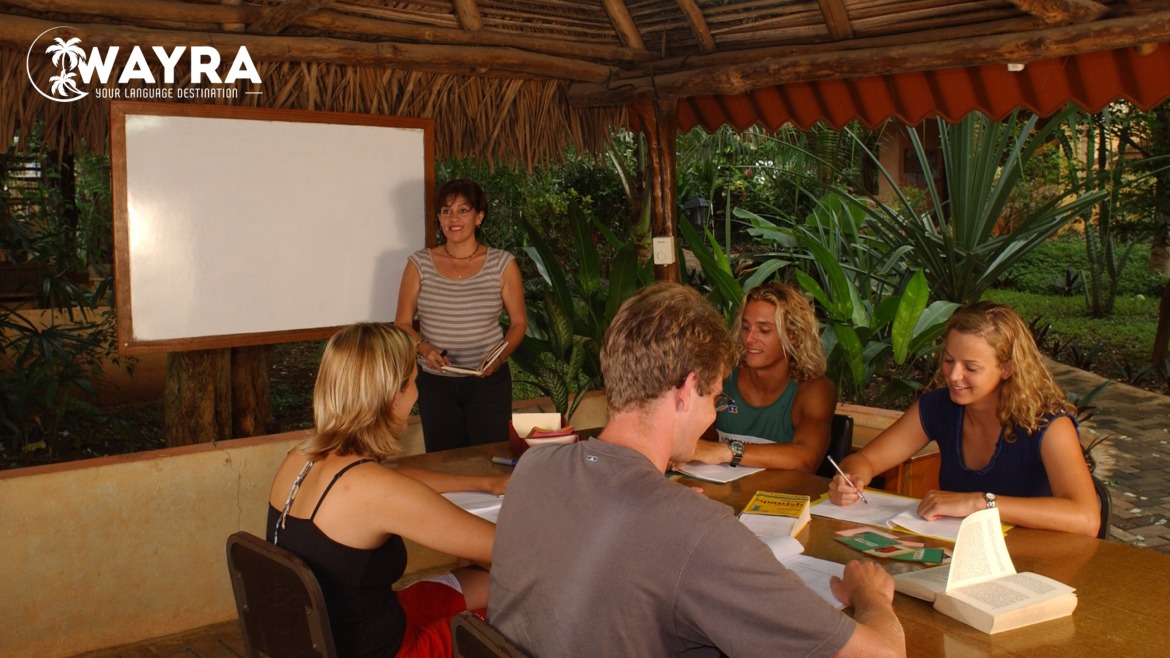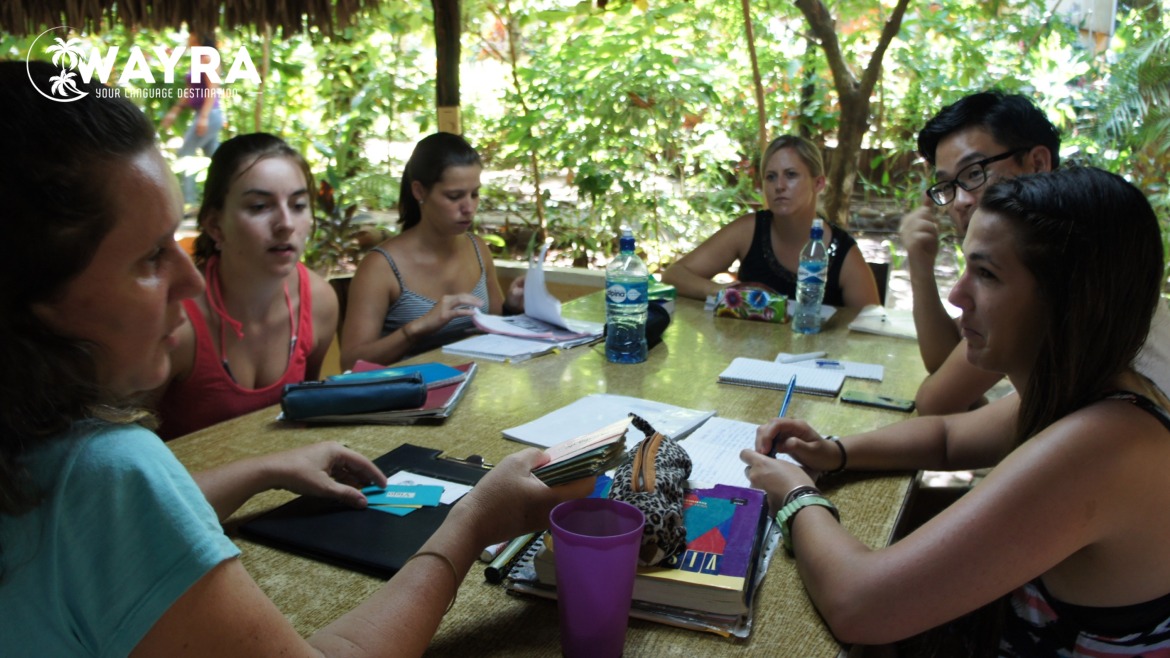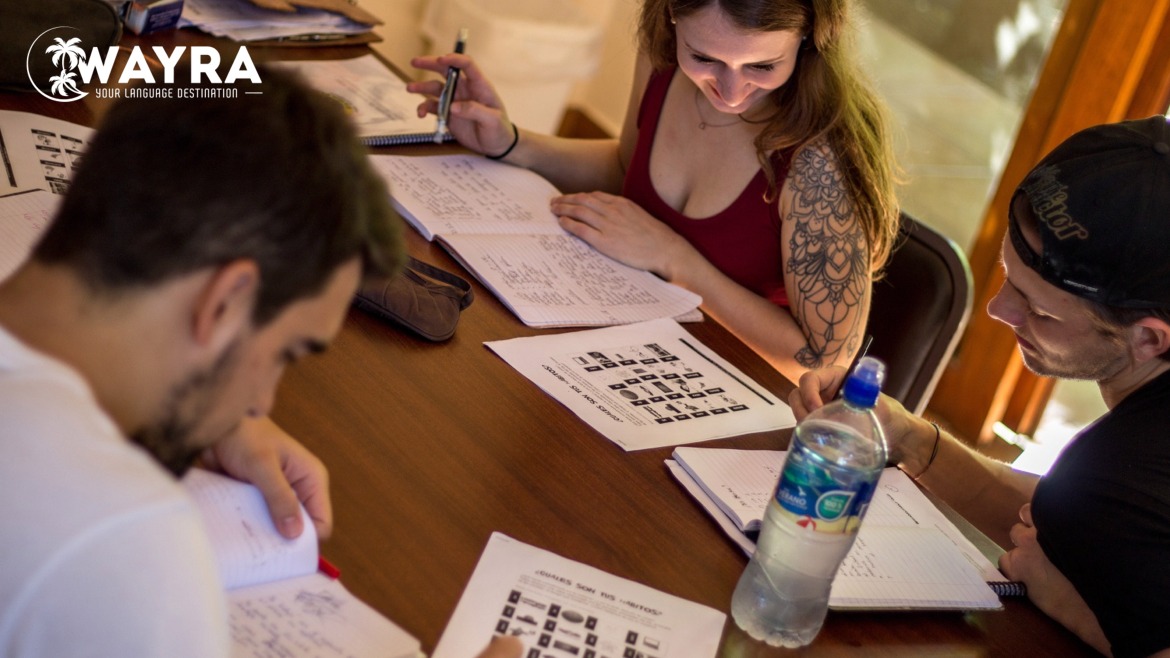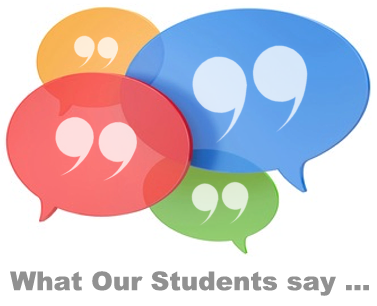


LEARNING SPANISH - TEXTS AND TEACHING METHODS
WAYRA has developed its own classroom methodology. Our textbook is designed to accelerate the learning process. Grammar is presented in an organized and logical manner followed by examples. An array of practice exercises and short stories give the students and teachers many conversational opportunities. Additionally, we incorporate materials from various conversational text sources. This results in an eclectic system that enables the student to learn Spanish as quickly as possible, with special attention paid to individual learning styles and modalities.
We maximize the students learning experience with a thoughtful balance of personal, cultural and academic challenges within a secure and supportive environment. The instructors are skilled in blending conversation with grammar to meet the individual needs of the group members.
In the classroom, we make learning an enjoyable natural process. Teachers encourage debate, conversation, and exchange of ideas to promote critical thinking and verbal skills. Games, videos and music are frequently used in the classrooms.
Outdoor activities, such as visits to different businesses in town to gather information and conversations with people from the community are all used to practice and learn more about the ecology, economy, and culture of Costa Rica. Your language ability will grow as your outlook broadens. Every day the students are required to do about one hour of homework.
SPANISH IMMERSION PROGRAM
- All teaching is carried out in Spanish to enable students to be totally immersed in the language during stay.
- Groups are small, averaging 3 to 4 students (maximum 6 students per class).
- All courses (including absolute beginners) start every Monday.
- The first day of class, all new students must arrive at the school by 7:15 am to be evaluated and placed in their appropriate level and to complete any necessary paperwork.
- All new students will receive a general orientation right after the placement test on the first day of School.
- According to individual progress, students may be moved to different groups during the program to maximize their learning.
- WAYRA determines if the students attend the morning or afternoon session.
- Morning sessions are from 8:00 am to 12:00 am and afternoon sessions are from 1:00 pm to 5:00 pm. There is a break of 20 minutes at 09.50 am and at 02.50 pm. Each lesson has a duration of 55 minutes.
- Students can choose between a wide varieties of courses.
OBJECTIVES AND CONTENTS OF OUR PROGRAMS
| CEFR Common European Framework of Reference for Languages | Aprox. weeks to achieve each level at WAYRA | Average Lessons per level at WAYRA | Aprox. Lessons to achieve each level starting from the beginning at WAYRA | Average Lessons with similar programs |
| A1 | 4 - 6 | 80 - 120 | 80 - 120 | 90 - 100 |
| A2 | 4 - 6 | 80 - 120 | 160 - 240 | 180 - 200 |
| B1 | 6 - 8 | 120 - 160 | 280 - 400 | 350 - 400 |
| B2 | 6 - 8 | 120 - 160 | 400 - 560 | 500 - 600 |
| C1 | 6 - 8 | 120 - 160 | 520 - 720 | 700 - 800 |
| C2 | 6 - 8 | 120 - 160 | 640 - 880 | 1000 - 1200 |
LEVEL A1
GOALS
The student does not require prior knowledge of Spanish at the beginning of the course. In the first week the student will acquire the basic linguistic skills to develop in situations of survival and acquire a basic vocabulary leading to his initial immersion in the local language and culture. In the next three weeks he will develop the ability to understand and use everyday expressions of very frequent use as well as simple phrases intended to meet immediate needs. He can introduce himself and others, order or buy food, ask for and give basic personal information about his home, belongings and the people he knows. He will be able to relate in an elementary way whenever his interlocutor speaks slowly and clearly and is willing to cooperate.
GENERAL CONTENTS
- Greetings and farewells.
- Present and introduce another person in formal and informal contexts.
- Distinguishing phonetic irregularities.
- Give and request basic information.
- Giving and requesting information. Asking for people's health and mood.
- Specify the location of different places and objects.
- Describe people's actions and identify them in a Situation.
- Value, give and ask for opinion.
- Describe a City.
- Express physical discomfort.
- Perform transactions in banks and Hotels.
- Describe routine actions and activities with a temporary location.
- Talk about past Actions.
- Talk about someone's life.
- Ask for and give information about the curriculum vitae.
LEVEL A2
GOALS
At the end of the course the student will be able to understand frequently used phrases and expressions related to areas of experience that are especially relevant to him (basic information about himself and his family, shopping, places of interest, occupations, social relationships, sports etc .) The student will be able to communicate when carrying out simple and everyday tasks that require simple and direct exchanges of information on issues that are familiar or habitual. He will be able to describe in simple terms aspects of his past and his environment as well as issues related to his immediate needs.
GENERAL CONTENTS
- React in simple terms to personal Information received.
- Obtain and provide personal information from family and friends.
- Obtain and provide very concrete information about past events and actions, expressing reactions and assessments in a simple way.
- Simply express gratefulness, satisfaction and dissatisfaction with the service received.
- Follow simple directions or instructions, cooking recipes, appliance instructions, etc.
- Follow simple directions and instructions that are in public and working places.
- Intervene, through simple and conventional formulas, in everyday social situations.
- Understand short and simple texts on daily life issues that contain frequently used vocabulary, capturing phrases and expressions and identifying the main topic.
- Understand the main idea of brief, clear and simple messages or messages in the media.
- Produce short and simple texts on everyday issues and needs through simple links of isolated phrases.
- Expressing or asking for states of mind and physical and pain sensations.
- Point out that it is not understood, request a repetition of what has been said.
- Ask someone to speak slower or louder.
- Discuss knowledge and degree of certainty.
- Refer to past actions and situations by combining unique events with common events.
- Refer to plans and projects.
- Express intentions.
LEVEL B1
GOALS
At the conclusion of the course the student will be able to understand the main points of texts that deal with specific or abstract topics if they deal with questions within the field of their knowledge. The student will be able to develop at times with enough fluency and naturalness but sometimes it will be evident, that the student needs to strive himself. He will be able to produce coherent and detailed texts on various topics in which he is interested. He can justify his opinion or defend his point of view on social, family and personal issues.
SPECIFIC OBJECTIVES
- Describe real or fictitious facts as a linear sequence of elements.
- Obtain and provide goods and services to meet needs.
- Solve practical problems or propose possible solutions.
- Provide simple but concise instructions when making arrangements.
- Participate improvised in formal and informal conversations on everyday issues.
- Participate with solvency, albeit in a simple way, in communicative exchanges that imply a certain emotional degree.
- Reformulate what is said by him or herself.
- Participate in everyday social situations, according to the most important courtesy standards.
- Extract the overall meaning of oral texts of a certain extent.
- Produce brief and cohesive texts on everyday issues, highlighting important aspects.
LEVEL B2
GOALS
At the conclusion of the course the student will be able to understand the main points of clear texts and in standard language if he deals with issues that are known to him, whether in study or leisure situations. He will be able to perform in most situations that may arise during a trip in areas where the language is used. He will be able to produce simple and coherent texts on topics that are familiar or in which he has a personal interest. He can describe experiences, events, desires and aspirations as well as briefly justify his opinions or explain his plans.
GENERAL CONTENTS
- Describe the situation or circumstances in which an event occurred.
- Make comparisons: highlight one thing among several.
- Narrate familiar stories or lived experiences.
- Hire common services such as tickets to a concert, cinema, parks, etc.
- Follow and provide simple but concise instructions.
- Participate improvised in formal and informal conversations referring to aspects of his or her life.
- Manage a simple yet effective repertoire of formulas for personal and even commercial correspondence.
- Obtain factual information on topics of interest.
- Narrate past events; Short stories or biographical experiences.
- Talk about hypothetical situations.
- Extract effectively key information from articles (journalism, encyclopedia, on the Internet) related to issues of special relevance.
- Summarize the central ideas of oral expositions or simple texts, structuring the summary in a consistent way with the general sense of the same.
- Provide brief, simple and pre-prepared information on subjects related to the student's specialty or interests, and can answer supplementary questions.
DOWNLOAD
SCHOOL

